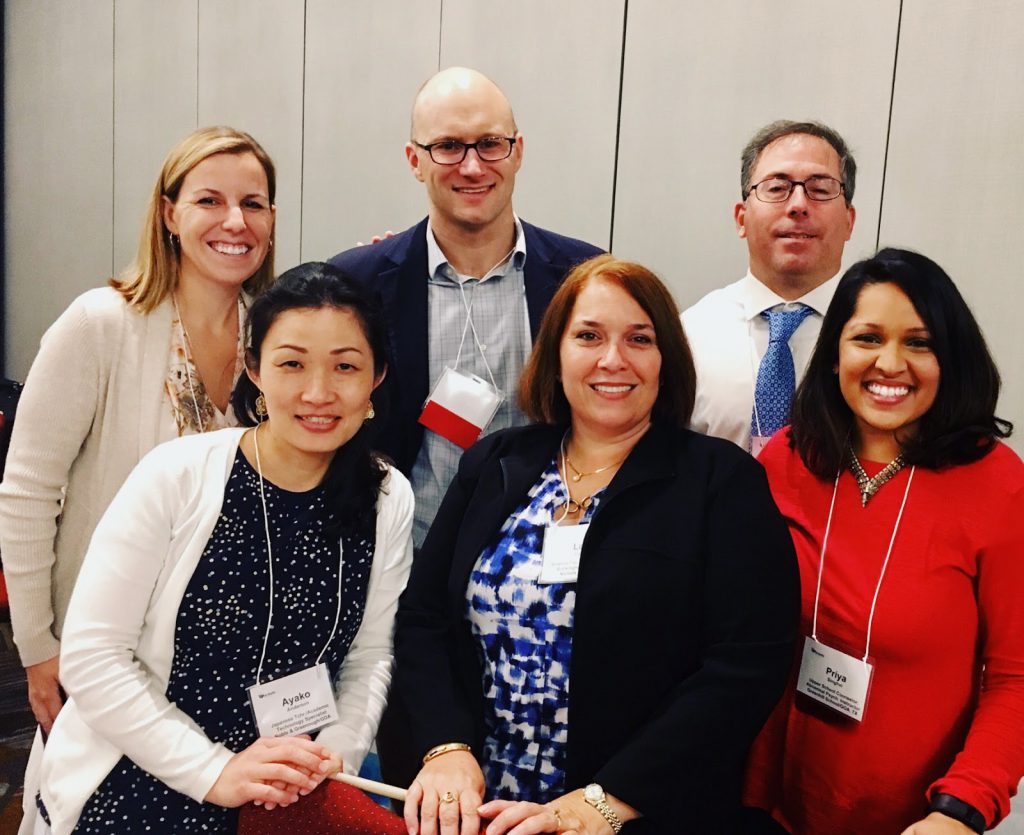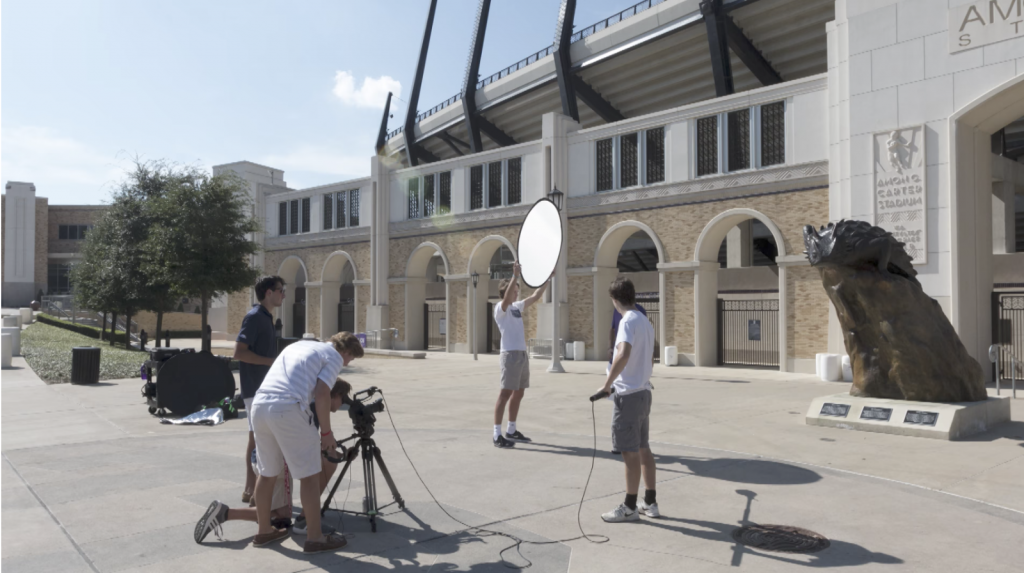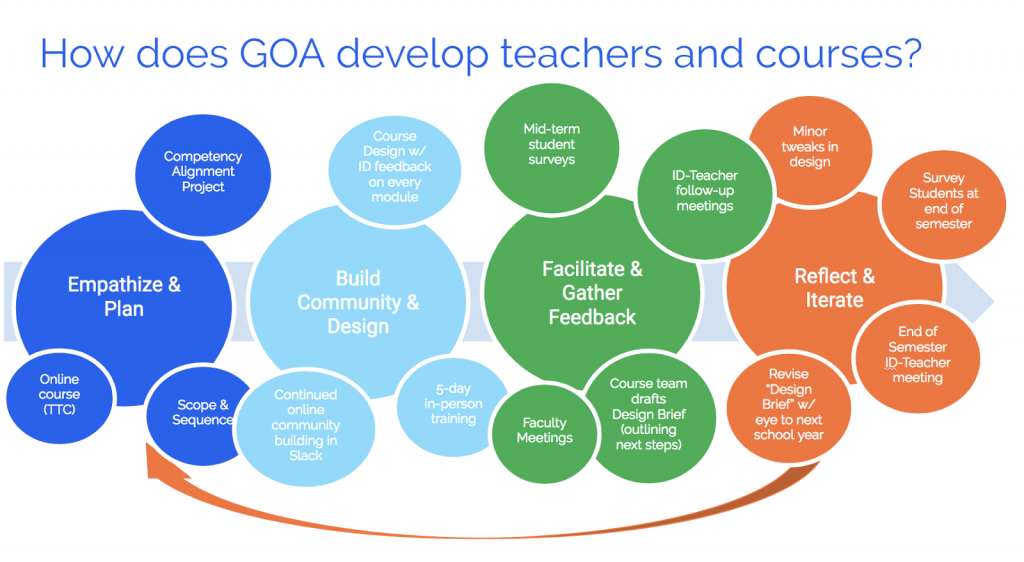The Power of Networks: Ten Ways Schools are Tackling Innovation
By Emily Hamlin and Jason Cummings
Each fall, the OESIS conference in Quincy, Massachusetts, provides the GOA faculty and staff with an invaluable opportunity to share our work. Just as important, however, is the opportunity to connect in person and share a few meals and a lot of good conversation. Whether online or in-person, deep learning is driven by the relationships between and among the teachers and learners who bring them to life. This year we were joined by colleagues Ayako Anderson from Noble and Greenough, Leah Cataldo from Buckingham Browne & Nichols, Matt Memmo from The Episcopal Academy, Jeff Torchon from Germantown Friends School, and Priya Singhvi from Greenhill School.
Knowing what we know about the value of community and relationships in designing networked, student-centered learning experiences, it was no surprise to see the value of networked teachers, students, and schools emerge as the primary theme at OESIS. Whether it was a teacher’s goals around equipping students with the skills and experiences to excel in a modern workforce or an administrator’s goals around shifting school culture, the most successful approaches to school innovation integrated people, places, and information beyond the scope of the classroom or campus.
In the same vein, many educators are shifting away from siloed, content-focused programs. Whether schools are moving toward competency-based learning or highlighting interdisciplinary collaborations, many are resisting the constraints of traditional disciplines and emphasizing skills like empathy and collaboration. In effect, the need to make our curricula more transdisciplinary and more connected to real-world skills lines up perfectly with the push towards more networked schools.
Integrated Media students at Oakridge School in Arlington, TX partner with local business and offer free marketing in exchange for an opportunity to develop technical skills and test their products a public audience.
Ten innovative, networked approaches to learning we saw at OESIS:
- Nate Green, teacher at the Flint Hill School in Oakton, VA shared a tool he created called Social Media Marketplace to help students pursue passion driving learning by designing their networks for learning on social media.
- Brent Powell and Marco Masoni from The Derryfield School spoke about how partnering with contests, organizations, and universities like UNH have supported their efforts to provide a platform for students to share their solutions to authentic problems initiated by public design challenges.
- English teacher Jared Colley of The Oakridge School and Joel Garza from Greenhill School, described how they constructed an organic network of local English teachers with the purpose of bringing students together to discuss literature and design immersive experiences across campuses.
- Melissa Triebwasser from Oakridge School described how she created an authentic opportunity for students to practice technical and entrepreneurial skills for their Integrated Media Course by pairing local businesses, interested in free marketing, with students eager to have a real audience for their work.
- Graig Marx and David Piemme were there talking about STEAM and Middle School Tech at Winchester Thurston – but there was plenty of conversation on the side about their City as Campus program which will be the centerpiece of their coLearn Conference this summer. Winchester Thurston is living many schools’ desires to re-think place, desires that echoed throughout our Rethinking School pop-up course earlier this month.
- Emily Hamlin was there to discuss GOA’s own work integrating global cultural competencies through project based learning by connecting over 300 students’ to a global audience when students present their local-action projects at the the Catalyst Conference.
- Hawken School HOS and Mastery Transcript Consortium (MTC) founder, Scott Looney outlined the imperative of replacing the century-old high school transcript and grading system with a system focused on skills and growth. Looney emphasized that this feedback-focussed approach to assessment and reporting will doubtless drive learning. Just as importantly, says Looney, it will start to alleviate the mental health crisis affecting American adolescents today.
- At Princeton Day School this skills-based approach is radiating out from the Middle School Humanities Department (Tara Quigley and Amy Beckford) where they have foregrounded clearly defined skills over traditional historical content.
- Kader Adjout and David Ingenthron of Beaver Country Day School discussed inter-disciplinary mixed grade collaborations in light of what they call the new basics: creative problem-solving, collaboration, iteration, visual communication, empathy, tech and media literacy, and presentation skills.
- All of these conversations are in line with the work that GOA has been doing over the last two years. At OESIS, Jason Cummings discussed GOA’s approach to building a competency-based faculty culture from articulating our core competencies, to charting out a plan for transitioning our program toward a fully competency-based approach by 2020.
The 2017 OESIS Learning Innovation Report of U.S. Independent Schools lists inter-disciplinary and mastery/competency-based approaches among the trends most often cited by school leaders as programmatic aspirations. Those same respondents listed establishing faculty culture as far and away the most significant barrier to effecting change in our schools. GOA is meeting this challenge head on – both with our own student program and through our professional learning partnership with the Mastery Transcript Consortium. Collaboration and networking within and among schools’ faculties is paramount to creating a more student-centered future, and we’re eager to lean into this work.
Global Online Academy (GOA) reimagines learning to empower students and teachers to thrive in a globally networked society. Professional learning opportunities are open to any educator. To sign up or to learn more, see our Professional Learning Opportunities for Educators or email hello@GlobalOnlineAcademy.org with the subject title “Professional Learning.” Follow us on Twitter @GOALearning. To stay up to date on GOA learning opportunities, sign up for our newsletter here.



